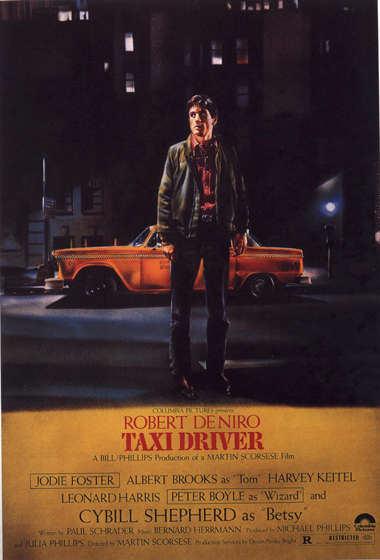Taxi Driver Gets a New Print For Its 35th Anniversary, Still Knocks 'em Dead
By Steven Pate in Arts & Entertainment on Jul 1, 2011 5:30PM
 Though fresh from a painstaking digital face-lift, Martin Scorsese's breakthrough 1970s Masterpiece Taxi Driver is not your typical summer escapist fare. The dark antipode of feel-good Spielbergian kinderfantasie like 8mm, the film is a gorgeous yet repellent head-on confrontation with the violent and sexual energies that crash through films like Transformers stripped of the CGI sheen and sublimation of mechanized bodies to absorb the supposedly cathartic violence. Its anti-hero Travis Bickle is a very different sort of Captain America, as if Steve Rogers had been injected with the bloody muck of My Lai instead of "super soldier serum."
Though fresh from a painstaking digital face-lift, Martin Scorsese's breakthrough 1970s Masterpiece Taxi Driver is not your typical summer escapist fare. The dark antipode of feel-good Spielbergian kinderfantasie like 8mm, the film is a gorgeous yet repellent head-on confrontation with the violent and sexual energies that crash through films like Transformers stripped of the CGI sheen and sublimation of mechanized bodies to absorb the supposedly cathartic violence. Its anti-hero Travis Bickle is a very different sort of Captain America, as if Steve Rogers had been injected with the bloody muck of My Lai instead of "super soldier serum."
But whether we're talking about the Odd Future controversy or following the trial of Jared Lee Laughner, there is every reason to believe that the strain of diseased misanthropy Scorsese parades onscreen remains virulent today. Taxi Driver is a landmark, whose startling violence was anchored by an unsettling, justly celebrated performance from Robert De Niro and which stormed through a chorus of boos to capture Cannes, wrangled four Oscar nominations, rode its controversy to box office success and catapulted its creator onto the shortlist of directors with household names.
A cinematic rosetta stone, Taxi Driver connects the European art cinema influences of its director and writer with the sensationalized, glamorized Hollywood fare which followed in its wake. Impressionistic dissolves, jump cuts, wild camera movements and long tracking shots endowed the sumptuous visuals with boundless vigor, and Scorsese's vision of New York City in the seventies has never been matched in its balance of hallucinatory expressiveness and seemy realism. When Tarantino's film career was just a twinkle in his junior high yearbook portrait's eye, Scorsese was brazenly quoting his own influences and showily rubbing them together to create sparks nobody had seen before, projecting Dirty Harry, Bonnie and Clyde and Shaft through the prism of Godard and Antonioni and Bresson but painting a picture of a character and milieu all his own.
It's not all film school fireworks, though. Cybill Shepard is ravishing as the unattainable object of the De Niro's affections, a 12-year-old Jodie Foster was required to subject herself to psychological testing to ensure she would not be emotionally traumatized by her role as a child prostitute, and the supporting cast wrung top-flight work out of Harvey Keitel, Albert Brooks and (especially) Peter Boyle. By the time De Niro's maladjusted loner Travis Bickle utters the film's - and one of film history's - most famous lines, the oppressive atmosphere of practically unbearable. That is thanks to Paul Schrader's menacing script, based on the diaries of George Wallace maimer Aurthur Bremer filtered through his own down-and-out depression, which struck enough of a cultural nerve to famously inspire John Hinckley, Jr. to try and kill Ronald Reagan. The score's indelible suspension of dreamy jazz within foreboding orchestral dissonance, completed by film titan Bernard Herrmann literally the day before he died, remains one of the master's most evocative: you have never heard foreboding harp until you've heard Bernard Herrmann's foreboding harp.
Despite the decades of increasingly graphically violent fare which still treads the trail this film blazed, its penultimate sequence, when Bickle's dreams of political assassination are abandoned in the name of a perversely righteous orgy of vigilante violence, remains one of the most spectacular climaxes in cinema history. In order to avoid an X rating, Scorsese was compelled to desaturate the color of the sequence, and that remains the only portion of the original film which could not be color corrected during Sony's 4K restoration. Though the gallons of spilled blood remain a darkened brick red, age seems unable to dull the vibrancy of this complicated and disturbing classic.
Taxi Driver opens for a week-long run tonight at the Music Box in a new 35mm print of its restored version.